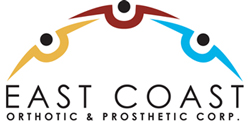East Coast Orthotic & Prosthetic Corp. was featured in the NY Daily News on June 24, 2004.
BY JOYCE SHELBY DAILY NEWS STAFF WRITER
Thursday, June 24, 2004
Countless women may one day thank Prof. Randall Barbour for the work he’s doing at SUNY Downstate in central Brooklyn.
That’s because Barbour is developing technology for breast imaging that does not include the compression required in mammography.
And Dr. Alfred Stracher, chairman of Downstate’s biochemistry department, could also win some grateful admirers for finding treatments for Duchenne muscular dystrophy, multiple sclerosis, hearing loss and nerve injuries.
The two men are hard at work in a new building that will be dedicated at Downstate today: the Advanced Biotechnology Incubator.
Located on Parkside Ave., a block from Downstate’s main campus and across the street from Kings County Hospital Center, the facility is for small companies that want to work on commercializing new technologies.
Eventually, the incubator will be home to as many as 30 such companies, said Eva Brown Cramer, Downstate’s vice president for biotechnology and scientific affairs.
Some of the companies are outgrowths of research done at Downstate, such as Barbour’s NIRx Medical Technologies and Stracher’s Ceptor Corp. Other companies, such as East Coast Orthotic and Prosthetic Corp., decided to take space in the new incubator for a variety of reasons, including the research Downstate was already doing, the medical resources the university provided or the population Downstate serves.
For example, one of the problems in the surrounding community of central Brooklyn is a high incidence of diabetes. East Coast Orthotic and Prosthetic Corp. is developing special shoes for diabetic patients with advanced foot ulcers.
Vincent Benenati, an orthotist with the company, said the shoes being developed are to help patients get back on their feet and avoid amputation.
Funded by government and private sources, the $12 million biotechnology incubator is the first in Brooklyn and the second in New York City. Columbia University opened one in 1995.
At Downstate, ImClone Systems was the first tenant in the biotechnology park and now has 40 employees conducting research on new cancer treatments.
“There was no way we could put our employees in our building in Manhattan,” said Peter Bohlen, senior vice president of research for ImClone. “It didn’t take long to decide this would be a good place for us.”
Cramer estimated the various small companies in the incubator would eventually employ about 100 people.
Once those companies are ready to produce, they will expand to the Brooklyn Army Terminal, creating as many as 800 jobs, she said.
Source: NY Daily News
